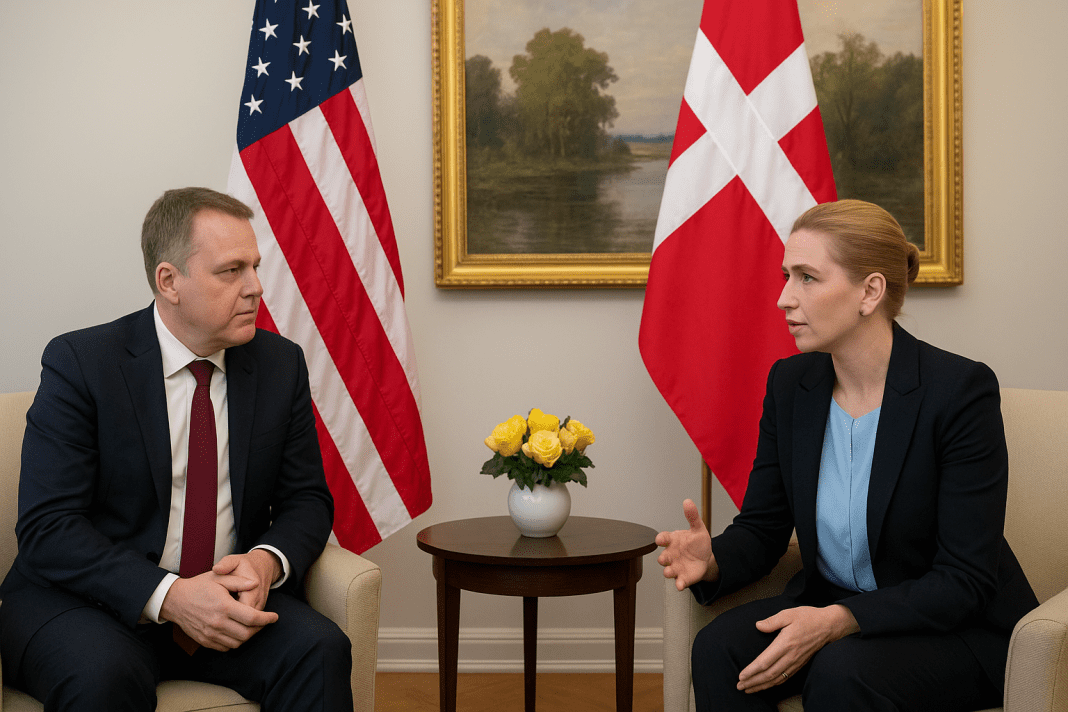A major diplomatic row has emerged after Denmark raised concerns about alleged American activities linked to Greenland secession claims. Reports suggested that individuals connected to the United States were trying to infiltrate Greenlandic society and encourage its separation from Denmark.
Greenland Secession Claims Spark Diplomatic Row
Denmark’s national broadcaster revealed that the alleged plan involved compiling lists of Greenlanders who might support Greenland secession claims and then recruiting them into a movement favoring US control.
Danish authorities have not presented direct evidence about who these individuals were working for, but allegations of Greenland secession claims have created unease in Copenhagen. Danish intelligence has warned that influence campaigns could aim to break Greenland’s ties with Denmark. Such efforts, it said, might include direct operatives or the spread of misinformation to deepen divisions.
Greenland Not for Sale —Hegseth Won’t Rule Out U.S. Invasion of Greenland or Panama
In response, Denmark summoned the most senior US diplomat in Copenhagen. Officials described the move as a “diplomatic yellow card,” signaling the seriousness of the issue. Security services also confirmed that they had strengthened their presence in Greenland following the reports of Greenland secession claims.
US Denies Role but Greenland Secession Claims Persist
The United States has dismissed Denmark’s concerns and urged its ally not to overreact. A White House official said that “the Danes need to calm down,” while the US State Department maintained that its diplomat in Copenhagen held a “productive conversation” with Danish authorities. Washington insisted it respected Greenland’s right to decide its own future.
However, the US did not deny that private American citizens may have been involved in activities tied to Greenland secession claims. Officials declined to comment on such actions, stressing that the US government could not be held responsible for private individuals. This stance has unsettled Denmark, especially after earlier reports suggested that American intelligence agencies had shown interest in Greenland’s independence movement.
Foreign Powers Threatened as Greenland Cracks Down on Foreign Interference in Elections
Tensions have grown further due to past remarks from American leaders highlighting Greenland’s strategic importance. Some openly expressed interest in acquiring the island, citing its mineral wealth and Arctic position. These statements, combined with the recent allegations, have raised Danish suspicions about Washington’s intentions.
Greenland’s Strategic and Political Importance
Greenland, the world’s largest island, is a semi-autonomous part of the Kingdom of Denmark. Since 1979, it has managed its own internal affairs, but foreign policy and defense remain under Denmark’s control. Its natural resources and location along Arctic shipping routes have made it highly strategic.
Greenland’s political parties generally support independence, though they differ on how fast it should happen. While Greenlanders can call for a referendum, most surveys show little support for joining the United States. Still, Greenland secession claims continue to be a flashpoint in diplomatic debates.
Danish intelligence has repeatedly warned that outside powers may seek to exploit Greenland secession claims to weaken the island’s connection to Denmark. Officials believe that existing disagreements or even fabricated disputes could be used to stir divisions between Greenland and Denmark.
Trump Donors Set to Strike Gold in Greenland – A High-Stakes Land Grab for the Rich!
The issue has also had economic fallout. Recently, a Danish multinational company building a major wind power project in the US was ordered to halt work, despite being nearly complete. The project was designed to power 350,000 homes, and the sudden stop caused the company’s shares to fall sharply.
The combination of stalled energy projects and Greenland secession claims has strained relations between Denmark and the United States, two countries that traditionally share close ties. Denmark, as a member of both NATO and the European Union, has long considered the US one of its most important allies. But the continuing disputes over Greenland’s future are testing that relationship.

